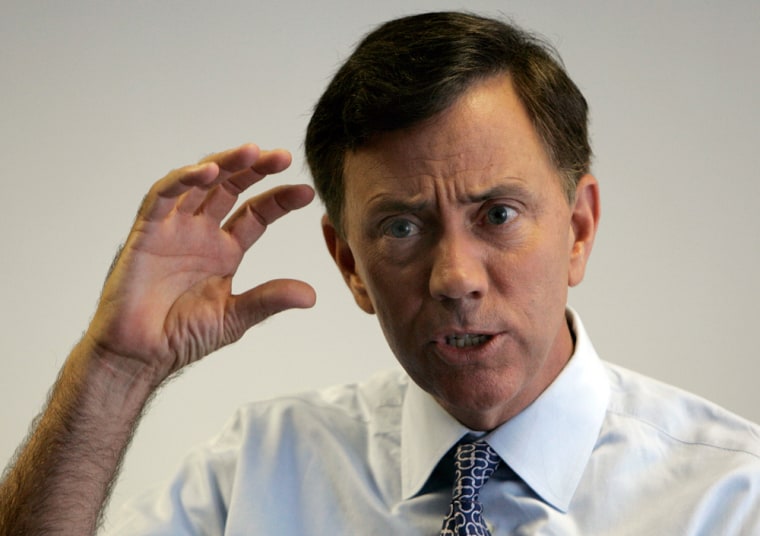Democratic Senate nominee Ned Lamont, the anti-war candidate who toppled Sen. Joe Lieberman in the Connecticut primary, says he was surprised by Lieberman and Vice President Dick Cheney’s claims that his victory could embolden terrorists.
“My God, here we have a terrorist threat against hearth and home, and the very first thing that comes out of their mind is how can we turn this to partisan advantage. I find that offensive,” Lamont said in an interview Sunday with The Associated Press.
After British officials disclosed they had thwarted a terrorist airline bombing plot on Thursday, Lieberman warned that Lamont’s call for a phased-withdrawal of troops from Iraq would be “taken as a tremendous victory” by terrorists.
Cheney on Wednesday had suggested that Lamont’s victory might encourage “the al-Qaida types” who want to “break the will of the American people in terms of our ability to stay in the fight and complete the task.”
‘Seemed almost orchestrated’
Lamont said Lieberman’s swipe at his candidacy “sounded an awful lot” like Cheney.
“It surprised me,” he said. “It seemed almost orchestrated. It’s sort of demeaning to the people of Connecticut ... I thought the senator and the vice president were both wrong to use that attack (strategy) on the voters of Connecticut.”
The Lieberman camp Sunday brushed aside Lamont’s comments.
“All Lieberman did was point out an important difference between his approach to national security and Ned Lamont’s, which is what campaigns are all about,” said Lieberman spokesman Dan Gerstein.
Lamont’s upset victory last week, fueled in part by liberal bloggers, was viewed by many as a referendum on Iraq and President Bush’s handling of the war. The debate has placed his candidacy in the national spotlight.
Lamont, who was in Washington for appearances on two Sunday TV news talk shows, is reaching out to the Democratic Party establishment for help in what is expected to be a bruising general election fight against Lieberman.
Democrats back nominee
Many top Democrats, including national party chairman Howard Dean and leading senators, have abandoned Lieberman, the party’s 2000 vice presidential nominee. They have lined up behind Lamont in the general election — a three-way fight that includes Republican Alan Schlesinger.
Some Democrats are urging Lieberman to drop his independent bid to clear a path for Lamont.
“It would be better for the Democratic party, it would be better for the people of Connecticut, it would be better for the country (if Lieberman got out of the race),” Sen. Russ Feingold, D-Minn., said on ABC’s “This Week” show.
Lamont said he had no idea whether Lieberman might reconsider his candidacy.
“It’s not helpful,” he said of the possibility Lieberman could play the role of the spoiler.
Lamont, meanwhile also said he doubted that Republicans would find a stronger candidate than Schlesinger, who trails far behind both Lamont and Lieberman in recent polls.
“My hunch is they’re not going to do that,” Lamont said.
‘Not changing my message’
Lamont, 52, the millionaire owner of a cable television company whose previous political experience was serving in local offices such as selectman in Greenwich, Conn. He said he had no plans to tailor his campaign message in the fall race to appeal to independents or moderates in both parties.
“I’m not changing my message one iota now,” Lamont said. “It is a message that resonates. It’s not just Democrats who think that we need real change in Washington, D.C.”
Lamont is a great-grandson of the former chairman of JP Morgan & Co. He has estimated that he’s worth between $90 million and $300 million. In 1984, he founded a company that wires college campuses for cable television.
Lamont spent about $4 million of his own money in the primary. He said he doubted he would have to provide a similar-sized cash infusion for the general election, but he vowed to remain competitive in terms of fundraising.
“We’re not going to be badly outspent,” Lamont said.
Lieberman has about $2 million in campaign funds for the fall race after spending roughly $5 million during the primary, according to campaign spokesman Gerstein, adding: “We will raise enough to win.”
